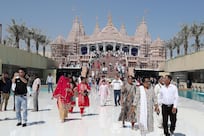Maan Al Sanea, the Saudi businessman embroiled in a bitter battle with the kingdom's Al Gosaibi family since 2009, had kept his powder dry for two years.
He had made no public statement since an initial denial of the allegations of fraud, theft and forgery levelled against him in courts in New York and the Cayman Islands.
But on Thursday he broke his silence with a long statement reiterating his innocence of those charges, and levelling countercharges against his accusers.
Observers of the long-running family feud - Mr Al Sanea is married to a member of the Al Gosaibi business partnership - took it as a sign he felt the pendulum was swinging his way.
He was emboldened to go public by the decision of a Cayman court to order the unfreezing of US$9.2 billion (Dh33.79bn) of global assets owned by Mr Al Sanea and his Saad Group of companies.
The freeze, won by the Al Gosaibis in June 2009, was a major weapon in the family's international legal battle against Mr Al Sanea; his statement acknowledged the "devastating effect" the freeze had on him personally, and on his business.
The Al Gosaibis, who have been much more vocal for most of the battle via an army of lawyers, accountants and publicists, responded to the unfreezing with their own statement pointing out they had voluntarily applied to have the freeze lifted, and committing themselves to ongoing actions against Mr Al Sanea. "The serious allegations remain intact," said Eric Lewis, the Al Gosaibis' lawyer.
To underline the capricious nature of the saga, on Friday a London court issued a new freezing order against Mr Al Sanea, this time brought by one of his companies, Saad Investments in Cayman, under the control of the liquidators Grant Thornton. Some $88.7 million of funds were frozen, taking the shine off Mr Al Sanea's earlier Cayman success.
So, while the complex legal actions continue, there are some broad themes emerging in the battle, which began initially over claims by the Al Gosaibis that Mr Al Sanea had forged documents to get access to billions of dollars in unauthorised loans, which, it was alleged, he syphoned off into his Saad Group and elsewhere.
From the Al Gosaibi perspective, central to those charges was their claim that Mr Al Sanea acted without the knowledge and approval of members of the family. Debts of some $10bn owed to bank creditors were not their responsibility, they argued, because Mr Al Sanea had misused their good name, and fraudulently obtained the funds, without their knowledge.
This allegation - consistently denied by Mr Al Sanea - was put to the test in a London court in June, and failed in the most bizarre circumstances.
Just weeks before the case was due to open, a London firm of lawyers, Withers, came across a bundle of previously unseen documents in a cupboard used by Saud Al Gosaibi, the managing director of Ahmad Hamad Al Gosaibi and Brothers, in the Saudi headquarters at Al Khobar.
When Withers disclosed the new evidence it caused a sensation in the London court because the papers - referred to as "bundle N" - contradicted the Al Gosaibi claim to have been ignorant of Mr Al Sanea's dealings. In some circumstances at least, in the late 1990s and early 2000s, there was regular correspondence regarding borrowing facilities between Saud Al Gosaibi and Mr Al Sanea.
The basis of the Al Gosaibi's defence was weakened, and they were forced to admit liability of at least some of the bank borrowings. Banks, including HSBC, were awarded the right to have $250m repaid by the Al Gosaibis. It was a setback that forced a change of strategy on the Al Gosaibi team.
Meanwhile, events on the other side of the Atlantic were also moving against them. Grant Thornton, appointed by Cayman courts to oversee the winding-up of Saad companies on behalf of creditors, had been regarded as sympathetic to the Al Gosaibis' claims they were deceived; but last spring, the liquidators made an about-face on this, and told the Cayman judge they believed the Al Gosaibis had knowledge of Mr Al Sanea's transactions.
In the face of this move, and the London court decision, the Al Gosaibis were left with little alternative but to seek to lift the Cayman freezing action; to have it continue would have required a new action, based on the potentially embarrassing new evidence.
Although they are putting a brave face on the London and Cayman developments, and promising to pursue other ongoing actions in New York, Los Angeles, Cayman Islands and elsewhere with renewed vigour, observers believe the Al Gosaibis are facing increasing financial pressure, and will now have to focus on their key constituency, Saudi Arabia.
The $250m of claims awarded against them in London has not been repaid, and their advisers have said it is unlikely they can be. There is also a mounting bill for costs in London and Cayman, which could run to multimillion-dollar levels, although the Al Gosaibis have also won some orders for costs in the Cayman action against Mr Al Sanea.
The London court ordered them to produce a statement of their available assets, on which to base an order for repayment of their creditors.
This document highlights the family's plight. Set against some $9bn of debts, the family can show about $2.13bn of assets, mainly in Saudi Arabia. The document carries a repeated caveat: "No valuation in this document should be relied on for any purpose."
Some foreign creditor banks are believed to be considering seeking wider asset disclosure from the family, to include any foreign assets belonging to individual members of the partnership. There are known to be Al Gosaibi properties in London and Switzerland, as well as links with Panamanian companies, that could attract creditor scrutiny.
Mr Al Sanea also faces challenges. There are allegations of fraud, forgery and theft against him in New York and the Cayman Islands, as well as ongoing legal action in other financial centres.
The pendulum may appear to have swung in his favour but, given the convoluted story of the past two years, it could still swing back.




